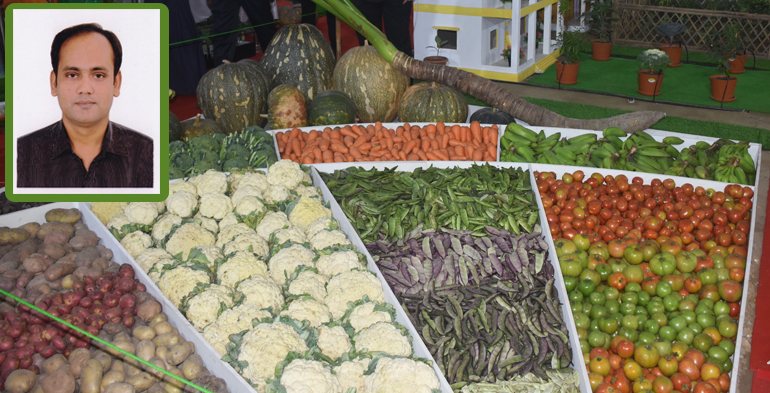
Md. Shahidullah:Bangladesh soil and climatic conditions favor agricultural production. Amazingly, Bangladesh stands globally 3rd in vegetable production, 7th in Mango production, 8th in potato and guava production and 4th in rice production. Though the country has massive potential in agriculture product export, the country could not harvest the full potential due to a lack of institutional efficiency and proper focus in exportable commercial agriculture.
The export basket of Bangladesh is limited to a few products; more than eighty percent of exportable products are Ready-Made Garments. According to the Export Promotion Bureau of Bangladesh, in 2020-21, total export earnings were 45 billion, whereas earnings from agricultural products, tea, vegetables, spices, and dry food were only 1.5 billion. For instance, only the Saskatchewan province of Canada exports nearly 12-billion-dollar agriculture products, primarily grain and fruits.
The world agricultural goods market size is nearly seven trillion dollars, whereas Bangladesh contributes only one hundred crore dollars. Bangladesh had produced 1.5-million-ton mango in the fiscal year 2019-20, only 279 metric tons were exported, which monetary values are fifty thousand dollars only. In 2020, Thailand, India, Pakistan exported mango values were 734 million dollars, 137 million and 101 million dollars, respectively.
Our neighboring countries such as India, Thailand, and Vietnam supply a significant portion of vegetables, fruits and value-added Agri-products in the European and American supermarkets. Bangladeshi agri-foods struggle to enter the mainstream supermarkets of developed countries due to non-compliance with sanitary and phytosanitary measures.
Ten years ago, the agricultural production export earnings were only 40 crore dollars. Currently, the Bangladesh government is focusing on diversifying the export item and increasing the export volume from the agricultural product. The government provides ten years of tax holiday and twenty per cent cash incentives in agricultural goods export. According to Export Promotion Bureau, 479 business organizations export agricultural goods in 144 countries; though coverage is high, the quantity and quality of exportable produces are low.
Exporting diversified and value-added agricultural products can be the greatest hope for the Bangladesh economy. Bangladesh lags in agricultural product export because the country does not adequately have world agricultural market information and does not focus on “Food politics and food diplomacy” efficiently. Besides these, the country is not well equipped to align with the world food standard in crop production and post-harvest handling.
Bangladesh should take comprehensive initiatives to boost agricultural product export. Farmers and growers, business and industry, certification bodies, agriculture extension department and Bangladesh missions abroad should work in a single line to boost the agriculture product export.
Bangladesh Mission abroad needs special attention to promote export earnings from agricultural products. Appointing an agricultural attaché in Bangladesh mission abroad will be responsible for researching the export market and adopting necessary measures to enhance agri-product export from Bangladesh. The agriculture trade wing will commence bilateral and multilateral trade agreements on agriculture and attempt to remove the barriers to entry into the foreign market.
There are instances of agricultural attachés appointed in diplomatic missions in different countries. USA, France, Netherlands, Germany and Australia have agricultural diplomats in 82 countries, 90 countries, 40 countries, 18 countries and 12 countries, respectively. For example, even a few Asian countries, the Philippines, China, and Thailand, have appointed agriculture officers/agricultural and environmental attaché in missions abroad.
Agriculture production according to buyers specific countries guidelines and standards is necessary. Tracing and documentation are the vital things in agriculture produce export. Implementation of country-specific standards such as Soil Association, ASEAN Standard for Organic Agriculture, European Sanitary and Phytosanitary requirement, USA FDA Regulations, Halal regulations for Muslim countries are very important in export. Bangladesh should immediately implement the proposed Bangladesh GAP keeping it aligned with other global standards such as Global GAP.
Government should develop storage, packaging, cargo facilities, and proper transport to facilitate agricultural produce export. The promotion of industrial agriculture and the country’s major business group should be motivated to invest in agro-processing industries on a large scale. A collaborative initiative between government and businesses can enhance exportable agriculture production and intensify exports.
Ease of doing business is a prerequisite to enhance the agriculture produces export. A tri-partite relation with the agriculture trade wing of Bangladesh missions abroad, the Department of Agricultural Extension in the field level, and the growers of exportable produces can accelerate Agri-goods export. A dedicated commercial agriculture wing is needed in the Department of Agricultural Extension (DAE) to coordinate nationally and internationally.
writer:Additional Deputy Director
Department of Agricultural Extension
Khamarbari, Dhaka.
email- This email address is being protected from spambots. You need JavaScript enabled to view it.